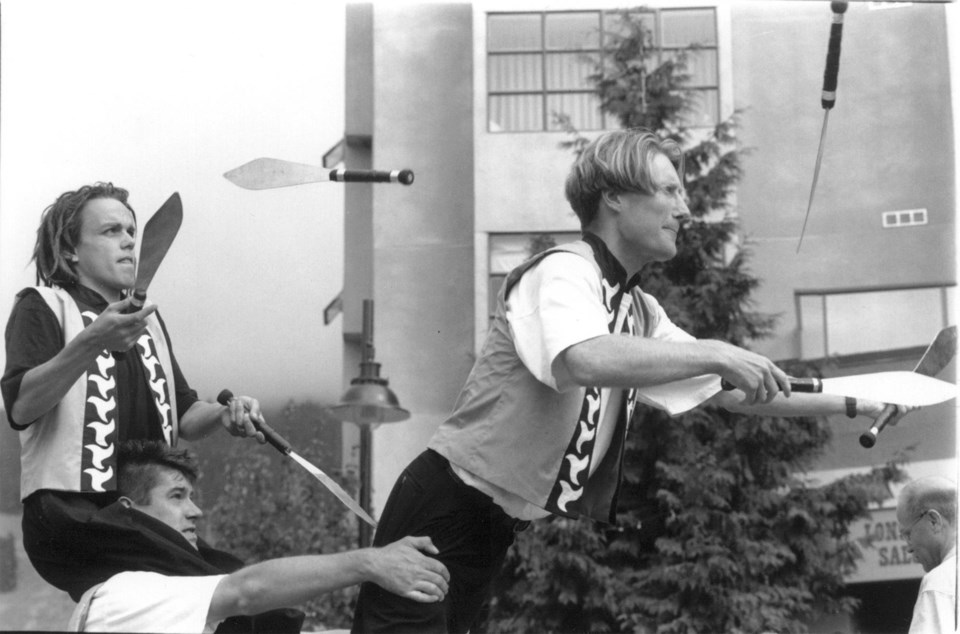In the mid-to-late 1980s, after working as the vice-president of marketing at Whistler Mountain Ski Corporation, Mike Hurst began a new position as the acting general manager of the Whistler Resort Association (WRA), known today as Tourism Whistler. While Vancouver had drawn international attention during Expo 86, summers in the Whistler resort were still quite slow, with some businesses even shutting down for the season. According to Hurst, “People would come up to the Village, and they’d come in, and they’d go to a restaurant, and then they’d walk around wondering what to do, and there’d be very little to do.”
In an effort to change this, Hurst contacted Maureen Douglas and Laurel Darnell of Street Access and asked them to organize street entertainment in the village for the summer of 1987. Though Douglas spent Expo 86 recovering from a broken leg, she was inspired by the “sleeper hit” street performers at the festival and wanted to ensure that talent wasn’t forgotten. She and Darnell formed Street Access Entertainment Society as a non-profit street entertainment booking and development society in Sept. 1986. They were soon contracted to organize three days a week of entertainment in Whistler.
Each weekend the village would host performances by jugglers, musicians, comedians, and character actors who roamed the Village Stroll. At the end of the summer, fifteen acts were brought together for the Whistler Street Festival Grand Finale over the Labour Day weekend to compete for a contract to perform at Expo 88 in Brisbane, Australia.
Street Access continued to organize summer street entertainment for the WRA, increasing to four days/week in 1988 and then seven days/week in 1989. The WRA then decided to bring festival and entertainment planning in house and asked Douglas to write a job description and apply. She began working at the WRA and ran the street entertainment program through the 1990s.
According to Douglas, each year’s lineup was made of about 50 per cent returning acts from the Lower Mainland and 50 per cent new or touring acts. One regular act was Carolyn Sadowska, who appeared as Queen Elizabeth II and would instruct visitors on points of etiquette, provide tiaras and props, and pose for photos. Other acts included Fifi Lafluff (“the world’s worst hairdresser”), cappella groups such as Party Fever, bands like the Mulberry Street Jazz Band, clowns, and comedic jugglers such as the Checkerboard Guy and Mike Battie (whose grand finale involved juggling pins and broccoli, which he proceeded to eat, accompanied by the William Tell Overture). Over the years Douglas also started to hire local musical acts, such as Stephen and Peter Vogler, singing group Colours on Key, and harpist Alison Hunter.
By most accounts, the street entertainment program was a big success. Through the 1990s the September festival was renamed Whistler’s Really Big Street Fest and weekly showcases were added to the schedule. Acts were carefully placed throughout the village, as some could attract audiences of 300 to 400 people. While this was all right in Village Square, in other areas those numbers created gridlock.
Whistler became part of the street entertainment circuit, joining other festivals across Canada in cities such as Halifax and Edmonton. While some of the other areas offered performers a chance to make a lot of money through busking, the WRA didn’t want the audience to have to pay and instead offered a “working holiday,” with a decent fee, accommodation, wine and cheese get-togethers on Fridays, and time to enjoy summer in Whistler. Douglas remembered that one of the producers of a busking festival once told her, “You know, our one beef with Whistler is that you guys are just too nice. They come here and then we don’t treat them quite as well and they’re miffed.”
Encouraging summer visitors was a large focus of the WRA and Hurst in the mid-to-late 1980s and street entertainment was just one strategy to increase numbers. For many visitors and residents, however, the performers were one of the most memorable parts of their village experience.





